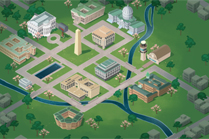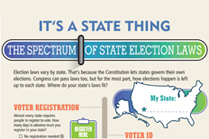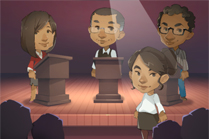|
|
| |
|
| Electoral Votes Go to Congress |
|
| The next step in the 2020 Presidential Election takes place January 6, 2021. Congress will meet to open and count electoral votes — an exercise required by the Constitution. Are your students asking questions about this event? Our lesson on The Electoral Process offers a timeline from Election Day to Inauguration Day that helps put the electoral vote count into perspective. For more resources, check out this blog by our partners at the National Constitution Center. |
|
| Our Election Headquarters is the place to go to find our full collection of teaching resources about the electoral process and the executive branch. |
|
|
|
|
|
|
|
| |
|
 |
|
| Take a Look Inside the President’s Cabinet |
|
| Our Cabinet Building lesson teaches the history of the presidential cabinet, the confirmation process, and why the cabinet is important. A Google Slide Deck version of this lesson is available that includes two slides on tracking the new cabinet!
|
|
|
|
|
|
 |
|
| Six Roles of the President Infographic |
|
| The president wears many hats, from Commander-in-Chief to Chief Executive. Use this printable infographic along with our game Executive Command to help students learn about the president’s executive powers.
|
|
|
|
|
|
|
 |
|
| NEW The Spectrum of State Election Laws Infographic |
|
| When it comes to voting, the rules one state follows can be quite different from another. With this infographic, students can explore the diversity of laws throughout the country and pinpoint where their state's laws fit.
|
|
|
|
|
|
 |
|
| The Fourth Branch: |
| You! |
|
| Citizens play an important role in all three branches of the government. In this lesson, students learn how to target the right government official with their concerns and how to measure the impact of their "citizen power."
|
|
|
|
|
|
|
|
|
|
| |
|
| In Case You Missed It: Our NCSS Panel with Composer
|
|
| During the NCSS 2020 conference in early December, we joined our partner, Composer, a FREE digital tool for accessing and designing powerful curriculum in citizenship education, for a “Civics vs. Citizenship Education” panel. The panelists addressed the evolving nature of civics education, their experiences in the classroom, and how to both engage students and support them in their broader development as citizens. Check out the list of resources shared, as well as the presentation.
|
|
|
|
|
|
| |
|
| Have a question for iCivics or need help navigating our site? |
|
|
|
|
|
|
|
| |
|
|
|
| |
|
|
|
| 1035 Cambridge Street, Suite 21B | Cambridge, MA 02141 |
| 617-356-8311 | www.iCivics.org |
|
|
|
|
|
|